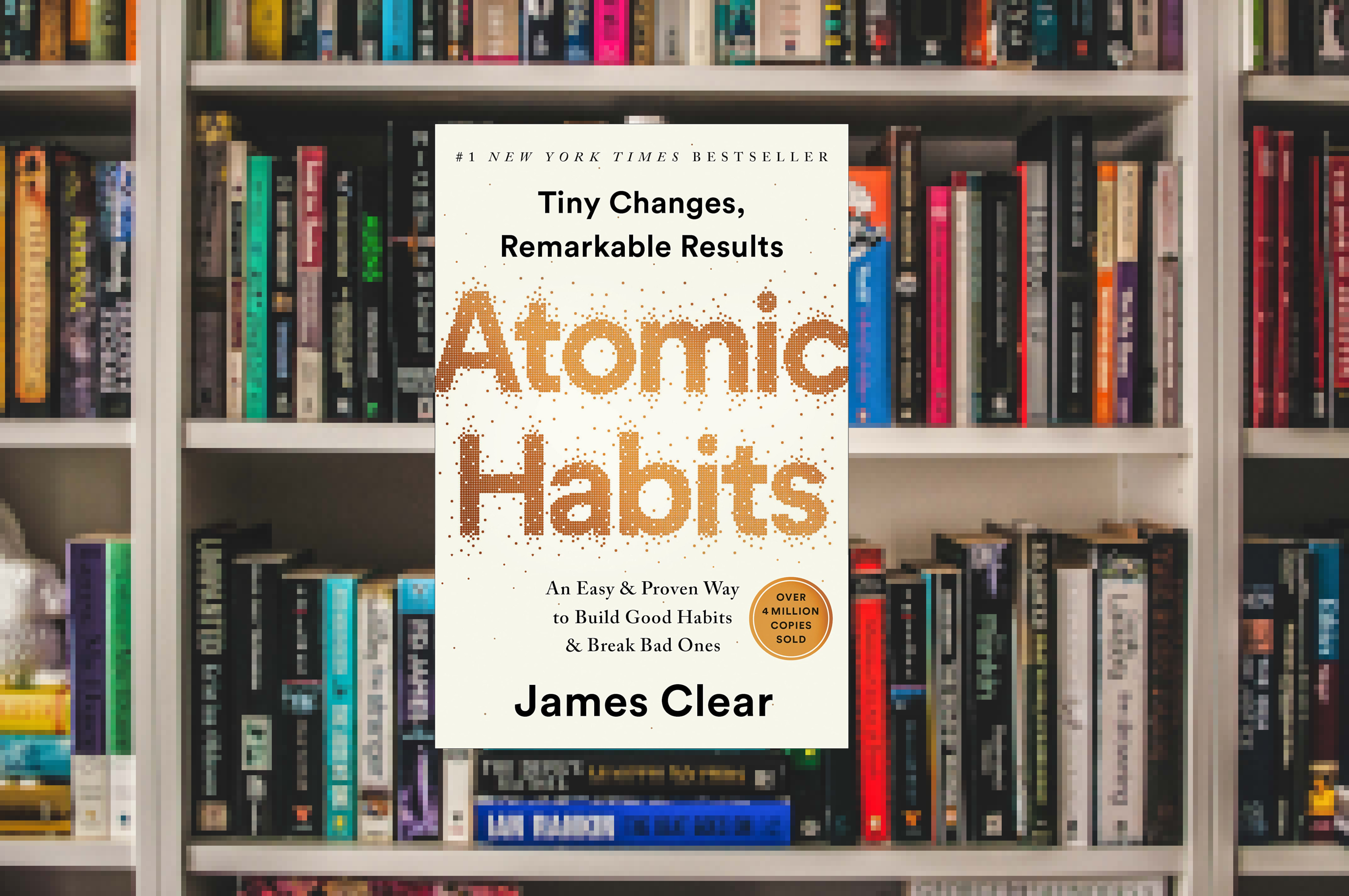
The Secret to Achieving Lasting Changes: Atomic Habits
Have you ever set a goal for yourself, whether it's to exercise more, eat healthier, or learn a new skill, only to find yourself struggling to make it a consistent part of your life? It can be incredibly frustrating to try and form a new habit, especially when it feels like no matter how much we try, we just can't seem to stick with it.
It's easy to get discouraged and give up on our goals when we don't see the progress we want. But what if I told you that the key to achieving lasting change in our lives isn't about making big, dramatic transformations, but rather about the small, incremental habits that we practice every day?
In his book "Atomic Habits", James Clear argues that it is the accumulation of these small habits that can lead to significant and lasting improvements in our lives. By understanding and implementing the Four Laws of Behavior Change, we can learn how to make our habits work for us rather than against us. And by focusing on our identity and aligning our habits with our values and goals, we can make lasting changes that reflect who we want to be.
In this summary, we'll explore the main concepts and ideas from "Atomic Habits", including the Four Laws of Behavior Change and the role of identity in shaping our habits. By the end, you'll have a framework for understanding and implementing small, incremental changes that can lead to big results in your own life.
The Four Laws of Behavior Change
One of the key ideas in "Atomic Habits" is the concept of the Four Laws of Behavior Change, which are:
Make it obvious: Make it easier to start a new habit by making it more visible and noticeable. According to Clear, we are more likely to take action when we are reminded of what we need to do. By making our habits more obvious, we increase the likelihood that we will remember to do them. For example, if you want to start exercising in the morning, you could put your workout clothes and shoes by your bed so you see them first thing when you wake up. This makes it more obvious that you need to exercise, and makes it easier for you to remember to do so.
Make it attractive: Make it more appealing to start a new habit by making it more enjoyable or rewarding. According to Clear, we are more likely to take action when it is enjoyable or rewarding. By making our habits more attractive, we increase the likelihood that we will want to do them. For example, if you want to start reading more, you could join a book club or find a genre that you really enjoy. This makes reading more attractive, and makes it more likely that you will want to do it.
Make it easy: Make it easier to start a new habit by simplifying the process. According to Clear, we are more likely to take action when it is easy to do. By making our habits easy, we increase the likelihood that we will be able to do them. For example, if you want to start meditating, you could use an app that guides you through the process or find a quiet, comfortable place to sit. This makes it easier to start meditating, and increases the likelihood that you will be able to stick with it.
Make it satisfying: Make it more rewarding to continue a habit by finding small ways to celebrate your progress. According to Clear, we are more likely to take action when it is satisfying or rewarding. By making our habits more satisfying, we increase the likelihood that we will want to continue doing them. For example, if you want to start saving money, you could treat yourself to a small reward every time you hit a savings milestone. This makes saving more satisfying, and increases the likelihood that you will continue to do it.
By understanding and implementing these Four Laws of Behavior Change, we can make it easier to start new habits and more rewarding to continue them. This can help us make lasting, positive changes in our lives.
Shifting Your Identity to Create Lasting Changes
In "Atomic Habits", James Clear argues that our habits reflect our identity, and that by shifting our identity, we can develop new, positive habits that align with our values and goals. This means that rather than just trying to change our behavior, we should focus on becoming the kind of person who naturally exhibits the behaviors we want to adopt.
To shift your identity and develop new habits, consider the following strategies:
Set specific and measurable goals that align with your values and vision for yourself. By setting clear and achievable goals, you can create a roadmap for your habits and stay motivated as you work towards them.
Identify the person you want to become and work towards embodying that identity. Think about the qualities and values you want to embody, and work on developing habits that reflect those qualities. For example, if you want to become more organized, you might focus on developing habits like creating a daily to-do list or decluttering your living space.
Find ways to make your habits more consistent with your desired identity. Consider how your current habits align with the person you want to become, and make changes as needed. For example, if you want to become more physically fit, you might need to adjust your diet and exercise routine.
Surround yourself with people who embody the identity you want to cultivate. The people we spend time with can have a big impact on our habits and behavior. By surrounding yourself with people who embody the qualities you want to cultivate, you can increase the chances of success in your habit formation journey.
Celebrate and reward your progress as you work towards your goals. As you make progress towards your goals, it's important to recognize and celebrate your achievements. This can help keep you motivated and make it easier to stick with your habits over the long term.
By implementing these strategies and focusing on our identity, we can make lasting changes in our lives and become the kind of person we want to be.
How to Maintain Consistency and Avoid Setbacks
One of the biggest challenges in forming new habits is maintaining consistency and avoiding setbacks. It's easy to get motivated and make a lot of progress at the beginning, but it can be harder to stick with it over the long term.
In "Atomic Habits", James Clear explores the influence of motivation and willpower on the development of habits and offers techniques to overcome frequent challenges and sustain consistency.
One strategy is to set specific and measurable goals that are aligned with your values and vision for yourself. This can help motivate you to take action and make progress towards your goals.
Another strategy is to break your goals down into small, incremental steps. This can make them feel more achievable and help you build momentum. By focusing on making small, consistent progress, you can increase the likelihood that you will stick with your habits over the long term.
It's also important to find ways to make your habits more enjoyable or rewarding. This can help keep you motivated and make it easier to stick with them. For example, if you want to start saving money, you might try setting up a rewards system for yourself. Every time you reach a certain savings milestone, you could treat yourself to something you've been wanting. This can make saving more enjoyable and rewarding, and increase the likelihood that you will stick with it.
Finally, it's important to be kind to yourself and recognize that setbacks and slips are a normal part of the process. Don't be too hard on yourself if you have a setback or miss a day. Instead, focus on getting back on track and making progress again.
By understanding the role of motivation and willpower in habit formation and implementing these strategies, you can overcome common obstacles and increase the likelihood that you will stick with your habits over the long term.
Small Habits, Big Results
If you've ever struggled to make a new habit stick, you know how frustrating it can be. But as "Atomic Habits" by James Clear argues, the key to achieving lasting change in our lives isn't about making big, dramatic transformations, but rather about the small, incremental habits that we practice every day.
By understanding and implementing the Four Laws of Behavior Change, we can learn how to make our habits work for us rather than against us. And by focusing on our identity and aligning our habits with our values and goals, we can make lasting changes that reflect who we want to be.
Throughout the book, Clear provides practical and actionable advice for implementing the Four Laws of Behavior Change and shifting our identity in order to create lasting change. He also discusses strategies for overcoming common obstacles to forming new habits and maintaining consistency.
If you're looking to make positive changes in your life, "Atomic Habits" is a must-read. It offers a clear and concise framework for understanding and implementing small, incremental habits that can lead to big results. So if you're ready to take the first step towards creating lasting change in your life, we highly recommend giving "Atomic Habits" a read.
